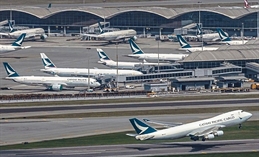
Hong Kong International Airport (HKIA) — one of the world's busiest cargo hubs — saw cargo volumes drop in February due to flight reductions from the hub implemented from the start of the year.
In a statement, the Airport Authority Hong Kong (AAHK) reported that cargo throughput declined 12.2% to 272,000 tonnes in February as flight movements also dropped by 1.9% to 8,330 compared to the same month in 2021.
This comes as the Hong Kong government earlier tighter quarantine measures for air cargo crew and introduced a flight ban from nine countries — including the United States (US) and the United Kingdom (UK) — as part of measures to combat the then growing outbreak of the Omicron variant in the city.
"Cargo throughput declined as a result of flight reductions following the emergence of the Omicron variant of Covid-19," the Airport Authority said.
It added that exports and transshipments were "affected most significantly," declining by double digits compared to the same month last year.
"Overall cargo to and from North America experienced the most significant decrease during the month," AAHK further said.
Meanwhile, HKIA handled 86,000 passengers for the month, representing a year-on-year increase of 80.2% although the Airport Authority said passenger volume continued to remain significantly lower than the pre-pandemic level recorded in 2019.
It said departure passengers to Mainland China and Southeast Asia experienced the most significant increases during the month, while transfer/ transit passenger volume underperformed due to tightened restrictions.
On a 12-month rolling basis, Hong Kong saw cargo volume increase by 8.5% to 5 million tonnes while flight movements rose by 12.4% to 145,285.
Flight ban lifted from April 1
Hong Kong has already announced on March 21 that the hub will be lifting on April 1 the earlier flight ban it implemented from nine countries — Australia, Canada, France, India, Pakistan, the Philippines, the UK, the US, and Nepal — as part of measures to ease its strict Covid-19 restriction.
This is expected to bode well for the hub's aviation and supply chain sectors with bellyhold and cargo capacity boost from flights coming in and out of the places earlier placed on flight suspension.



